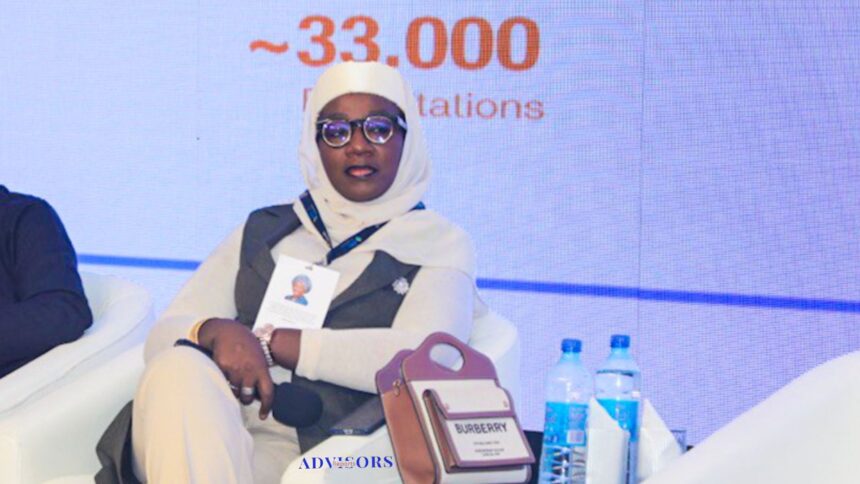“NMDPRA runs automated consumer experience platform to enable customers report operators directly to us” – Prof. Gobir, ED ERSP
says Authority is developing comprehensive data bank to provide operators real-time market insights
Oredola Adeola
The Nigerian Midstream and Downstream Petroleum Regulatory Authority (NMDPRA) has urged investors in the midstream and downstream oil and gas sectors to rethink their business models and look beyond the South-South and South-West regions, stressing that the northern market (with a significant population) holds untapped potential critical to Nigeria’s energy growth.
Prof. Zainab Gobir, Executive Director, Economic Regulation and Strategic Planning (ERSP) at NMDPRA, made the call at Day 3 of the OTL Africa Downstream Energy Week 2025 in Lagos.
According to her, “the numbers exist across all regions—not just in the South,” and that investors must expand their focus to ensure equitable participation and nationwide energy access.
The NMDPRA’s ED emphasised that population and available volumes in other regions matter, and companies must model their operations around that to optimise margins and logistics.
She further disclosed that the Authority is leveraging Artificial Intelligence (AI) and data analytics to deepen transparency, efficiency, and investor engagement across Nigeria’s downstream and midstream oil and gas sectors.
Prof. Gobir said, “We are deploying AI for data collection and integrating it into our operations. We are taking data from Nigerians, especially feedback on certain operational models that are creating bottlenecks.
“We are getting to a level where you can see how much operators are charging and make a choice of the retail outlet you want to patronise.”
She also explained that the Authority is automating key regulatory processes to enhance efficiency and compliance.
“What NMDPRA is doing on innovation involves digitising most of its processes and people. We get customer platforms activated following all necessary due processes—based on licensing and qualification approvals.
“We are tracking pricing and market behaviour because we are very aware of market dynamics.
“Through predictive and regression analysis, we are able to understand the peculiarities of each oil and gas segment in the midstream and downstream sectors,” she noted.
According to her, NMDPRA is also building a comprehensive data bank to give operators access to real-time information for market monitoring and business development.
“We are working on a data bank where people will be able to access information on our website to enable operators to monitor the market and build their businesses.
“We have automated our investment portal where potential investors can enroll and join monthly roundtables to discuss opportunities in the sector,” the ED said.
She further revealed that consumer experience has also been automated to make the Authority more accessible to the public.
“We have automated our consumer experience platform so customers can interact directly with the Authority and report market issues. We are easily accessible to ensure we serve the industry effectively.
“In the future, we recognise the importance of technology and its impact on the market. This is interesting because we have seen the significance of the game of numbers in innovation.”
Prof. Gobir described Nigeria’s downstream sector as both data-driven and population-driven.
Speaking on the significance of population to taxation and operational efficiency, she noted:
“Taxation adds up. When companies pay ₦500,000 in taxes, it’s not just the amount that matters but the volume and population that determine how far petroleum products can be transported in terms of gas and petrol.”
Highlighting the inevitability of technology adoption, the ED said, “Automation is a reality for everyone. If you don’t jump on the AI boat, you will be left behind.
According to her AI is not here to replace humans; it is for monitoring because, at the end of the day, someone will still be held accountable—not the digital resources.
“AI should be seen as a tool to help scale the market, not as a replacement for human resources,” she said.
She emphasised that NMDPRA has evolved from a traditional regulator to an enabler, supporting operators—particularly small and medium enterprises—to scale their businesses and reach customers.
“We have gone beyond the role of a regulator to help operators scale, especially MSMEs that need to connect with customers.
“For smaller operators, the initiatives we have put in place, especially our data platforms, are encouraging.
For example, in LPG, when operators provide us with their data, it helps customers locate the nearest LPG depot to them.
“That is the importance of data. If the depot is on our portal, it helps us advertise them to customers, increasing visibility and ensuring regulatory compliance.”
She also revealed that the NMDPRA is open to third-party data integration to further strengthen its digital ecosystem.
“This is a necessity. We are accepting third-party data into our automated system to ensure inclusivity and better market monitoring,” Prof. Gobir stated.




